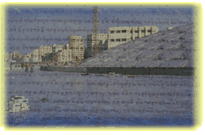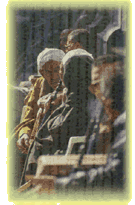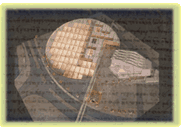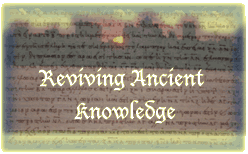 |
 |
 |
|
|||
|
Reviving Ancient Knowledge By just about any standard, the ancient Library of Alexandria remains a tough act to follow. The world's first general interest library, the institution was founded in the 4th century B.C. with the objective of obtaining a copy of every book on the face of the earth, and it almost did just that. The library's estimated 500,000 scrolls comprised the largest collection of books in the ancient world. And we're talking some pretty heavy duty reading material here, like the works of Aristotle, Aeschylus, Sophocles, and Euripedes, the complete works of those authors, mind you, not just the fragments we have today, and in their original texts. Needed to brush up on your geometry? You could try reading the scribblings of one the library's resident scholars, Euclid, whose book The Elements of Geometry remains the standard in most high schools today. And, some 2,000 years before Columbus, a chief librarian here named Eratosthones not only figured out that the world was round, but accurately calculated both its circumference and diameter to within fifty miles. 
Historians believe that the Library was here, along the waters of the eastern harbor, in what was the city's royal quarter. This is where Queen Cleopatra built her palace and entertained, shall we say, the likes of Mark Anthony and Julius Caesar. It was the library's desirable location, ironically, that ultimately led to its destruction. In a battle between Caesar and Cleopatra's kid brother Ptolomy in 48 B.C. for the throne of Egypt, the royal quarter was burned and with it, tragically, most of the contents of the Great Library. Whatever volumes survived were placed in a kind of branch library in a nearby temple complex, which, unfortunately, was also razed a few centuries later, this time by zealous Christians determined to rid Alexandria of all vestiges of its pagan past.
Fortunately, there wasn't any water in the reflecting pool when I was standing in it alongside Alaa Elkot, site architect for the Bibliotheca Alexandrina, the new Library at Alexandria. The pool water together with the rest of the building and its contents should be in place for the official inauguration in the spring of 2001, Elkot assured me. But with 90 percent of the building's exterior complete, the library has already established itself as a permanent, if not somewhat jarring element of Alexandria's predominantly 19th and early 20th century skyline. Located along the banks of the eastern harbor, in roughly the same neighborhood as its ancient predecessor, this round, glittering, glass and aluminum structure rises some 100 feet from the ground, like a disc tilted on edge. Beside it is a planetarium, part of the library complex, a neon lit sphere, free-floating, it seems, in the complex's open air plaza. The visual suggestion here is of a rising sun and orbiting planet, a concept that project manager Moshen Zahran says reflects the ideology of both the ancient and the modern Libraries of Alexandria. 
And that's something dowdy old Alexandria, with its faded but enduring charm, could use a bit of, if it wants to compete with some of its tourist-rich sister cities like Cairo, Luxor or Aswan. Of course, Zahran and others who began planning the library thirty years ago realize that people aren't going to come all the way to Alexandria just to read books, so the master plan calls for a science museum, a calligraphy museum, an archaeology museum, as well as a convention center where it's hoped scholars from around the world, especially those interested in Alexandrian history and Islamic studies, will gather, just as they did at the ancient library, to conduct research and hold symposia. By the time the last panel of polished, Zimbabwean black granite is screwed into place in the main reading area and the parquet floors have had their final coat of polyurethane, the total project should cost about $200 million, funding provided by the Egyptian government and UNESCO, together with a whole host of donors, ranging from Silicone Valley moguls to Saddam Hussein, who kicked in $21 million just before he left to invade Kuwait. There are those who say the money could have been better spent revamping Alexandria's existing public library system, which hasn't added a new book to its collections since the mid-fifties, or perhaps teaching some of Egypt's population how to read in the face of its 60 percent illiteracy rate. Still, there's something to be said for the sheer hutzpah involved in the resurrection of an ancient wonder that scholars still speak of with reverence. Mostafa El-Abbadi, one of the founders of the new library, is a professor of classical studies at the University of Alexandria. 
In Alexandria, Egypt, I'm Tom Verde for The Savvy Traveler
|
 | American Public Media Home | Search | How to Listen ©2004 American Public Media | Terms of Use | Privacy Policy |
